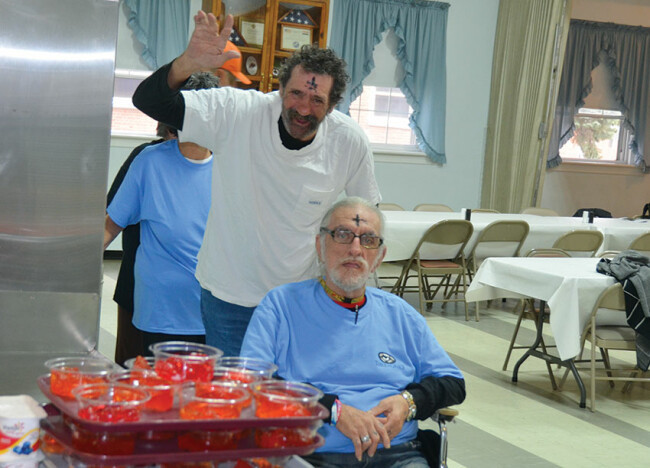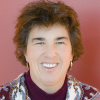Essex UMC opens new doors to ministry
By Melissa Lauber
UMConnection Staff

Community members prepare for the Table of Grace meal at Essex UMC.
At Essex UMC, there is an entire community that comes in through the “other doors” of the building. Making sure these people experience the love of God is one of the congregation’s best strengths.
“This is almost like another congregation,” said Pastor Mary E. Robinson, who serves Essex UMC. The church feeds them, provides Communion, shares prayer concerns, hands out devotional booklets and Bibles, and even offers ashes and blessings on Ash Wednesday. Plans are also underway for a summer Bible study prior to the meal.
The door they enter through leads to the Table of Grace, a weekly dinner for the
Tables of Grace has also extended opportunities to “Friends of the Table,” which allows people to serve the guests by sorting clothes for a clothing bank and helping with set-up. There are now five friends, who themselves receive some of the outreach services.
Not all the guests are homeless. In Baltimore County, more than one in every 10 people live below the poverty line of a $23,850 income for a family of four. One in eight families faces a constant struggle against hunger and nearly a quarter of households with children struggle to obtain enough food to provide regular, healthy meals for their families.
Table of Grace started in 2009 as an off-shoot of a food pantry, which still exists, giving away nonperishables on Tuesdays and Thursdays to 10 to 15 families. But along the way, some of the clients asked for hot food.
“We just made a pot of chili and opened the doors,” said Carol Wehner one of the
“Dawn, Pat R., Pat, Bonnie
Robinson is encouraged at how empowered the volunteers are.
“They serve as an act of faith,” she said. They’ve created a ministry that offers 10,000 meals a year. There is not a lot of money. The food comes from food banks, a small grant
“I don’t see the people who come as homeless,” Robinson said. “I see them as my congregation, and because I see them as my congregation, I’m able to be their pastor.”
Her pastoral concern is expressed in the way she jokes and shares deep concerns with the Table of Grace guests.
“They face a lot of emotional challenges,” she said. “Many of these people are working class folks who are unemployed, disabled and veterans. They are searching for resources and don’t know where to begin. That brings a lot of emotional challenges and questions about where is God?
“Some of the guests have hit rock bottom and don’t see a way out,” she continued. “I want them to feel included. Even though they are without, they’re a part of God’s kingdom. They, too, are loved.”
Robinson grew up in the inner city of Baltimore. At age 14, she would gather her sister and some of the other neighborhood kids and walk to the after-school latchkey program at Christ Edmondson UMC. Robinson came to experience God’s love through a “side door” ministry.
“Outreach ministries, such as afterschool programs, Table of Grace and clothing pantries, can have an everlasting impact on one’s experience with God and spiritual formation,” she said. “I think that it is very important to remember to also pastor the people who come through the ‘other doors.’”
In the coming months, Robinson will be leading a steering committee of Baltimore Metro pastors in consultation with Rev. Stacey Cole Wilson and Baltimore County leaders to find ways for East Baltimore County United Methodist churches to work together to strengthen their ministry with homeless and near homeless people.
The Rev. Ed DeLong, superintendent of the Baltimore Metropolitan District, is excited about this strategic approach to addressing homelessness.
In a meeting with county leaders and the new steering committee, DeLong said that the number one issue during last fall’s charge conferences related to homelessness and how the many ministries offered by local United Methodist congregations could be strengthened if churches worked together. He expressed optimism about these churches providing resources that could prepare people to move toward a more self-sufficient life.
At Essex UMC, Robinson has a vision of using the church’s classroom space to offer GED, English as a Second Language, and computer classes to educate and empower the church’s neighbors to go out and be productive. It will be another door by which people can enter the church.

